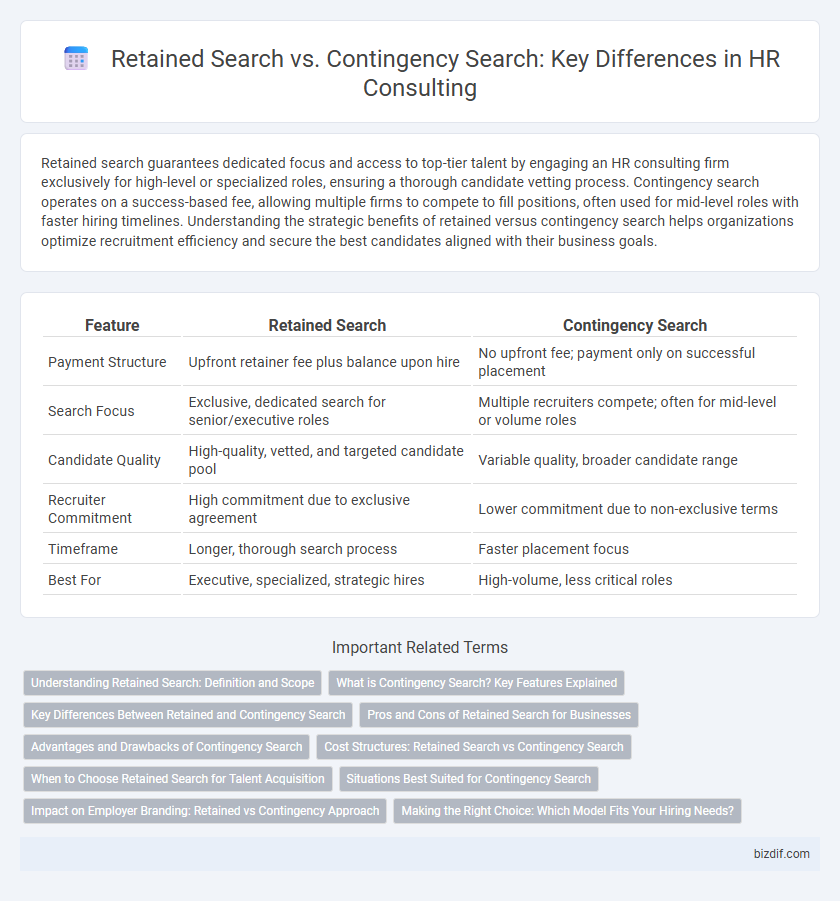Retained search guarantees dedicated focus and access to top-tier talent by engaging an HR consulting firm exclusively for high-level or specialized roles, ensuring a thorough candidate vetting process. Contingency search operates on a success-based fee, allowing multiple firms to compete to fill positions, often used for mid-level roles with faster hiring timelines. Understanding the strategic benefits of retained versus contingency search helps organizations optimize recruitment efficiency and secure the best candidates aligned with their business goals.
Table of Comparison
| Feature | Retained Search | Contingency Search |
|---|---|---|
| Payment Structure | Upfront retainer fee plus balance upon hire | No upfront fee; payment only on successful placement |
| Search Focus | Exclusive, dedicated search for senior/executive roles | Multiple recruiters compete; often for mid-level or volume roles |
| Candidate Quality | High-quality, vetted, and targeted candidate pool | Variable quality, broader candidate range |
| Recruiter Commitment | High commitment due to exclusive agreement | Lower commitment due to non-exclusive terms |
| Timeframe | Longer, thorough search process | Faster placement focus |
| Best For | Executive, specialized, strategic hires | High-volume, less critical roles |
Understanding Retained Search: Definition and Scope
Retained search is a specialized recruitment service where HR consultants work exclusively with a client to fill key executive or senior-level positions, ensuring dedicated resources and in-depth candidate vetting. This method involves a contractual agreement with a retainer fee, reflecting a commitment to a comprehensive search process and higher-quality candidate selection. Retained search typically covers confidential or strategic hires, benefiting organizations seeking top talent through proactive and targeted sourcing strategies.
What is Contingency Search? Key Features Explained
Contingency search is a recruitment process where HR consultants only receive payment upon successfully placing a candidate, emphasizing performance-based results. Key features include multiple firms competing to fill the role, no upfront fees, and a focus on quick candidate delivery to meet urgent hiring needs. This approach suits companies seeking flexible, cost-effective recruitment without exclusive commitments.
Key Differences Between Retained and Contingency Search
Retained search involves an exclusive partnership where firms are paid upfront to conduct a thorough and dedicated candidate search, ensuring higher commitment and quality. Contingency search operates on a no-win, no-fee basis, with multiple recruiters competing to fill the position, often leading to faster but less comprehensive candidate sourcing. Key differences include payment structure, recruiter commitment, candidate quality, and exclusivity of the search process.
Pros and Cons of Retained Search for Businesses
Retained Search offers businesses dedicated focus and access to top executive talent through a committed partnership, enhancing candidate quality and confidentiality. The upfront fee model ensures priority service and thorough market research, but it can be costly and less flexible for companies with limited hiring needs. While Retained Search is ideal for critical leadership roles, its fixed cost may not suit organizations seeking multiple hires or quick placements.
Advantages and Drawbacks of Contingency Search
Contingency search in HR consulting offers the advantage of no upfront fees, with payment only upon successful candidate placement, making it cost-effective for companies with limited budgets. However, this method often results in less exclusivity and lower recruiter commitment, as multiple firms may compete to fill the same position, potentially reducing the quality of candidate matches. The lack of guaranteed focus and increased competition can lead to longer search times and candidates who may not fully align with the company's culture or long-term needs.
Cost Structures: Retained Search vs Contingency Search
Retained search typically charges a fixed upfront fee, often one-third of the candidate's first-year salary, ensuring dedicated resources and exclusive focus on filling key executive roles. Contingency search operates on a no-win, no-fee basis, with payment due only upon successful placement, making it cost-effective for volume hiring but less reliable for niche or high-level positions. Understanding these cost structures helps organizations align their recruitment strategy with budget constraints and talent acquisition goals.
When to Choose Retained Search for Talent Acquisition
Retained search is ideal for critical, executive-level positions requiring a dedicated, in-depth recruitment process with exclusive agency engagement. Companies seek retained search when talent acquisition demands confidentiality, a highly specialized candidate pool, and strategic alignment with organizational goals. This method ensures focused resources and expert candidate vetting, leading to higher success rates in securing top-tier talent.
Situations Best Suited for Contingency Search
Contingency search is best suited for volume hiring or mid-level positions where multiple candidates are needed quickly without exclusive agreements. Companies benefit from its cost-effectiveness and flexibility when time-sensitive talent acquisition is critical, particularly in competitive markets. This approach excels in scenarios where a wide talent pool is available and the employer prefers paying only upon successful placement.
Impact on Employer Branding: Retained vs Contingency Approach
Retained search enhances employer branding by fostering a collaborative partnership that emphasizes quality, confidentiality, and strategic talent alignment, projecting a premium image to candidates. Contingency search often prioritizes speed and volume, which can dilute employer brand perception due to less personalized candidate engagement and potential overexposure of job openings. Choosing retained search signals a commitment to a thorough, candidate-centric hiring process that strengthens long-term employer reputation.
Making the Right Choice: Which Model Fits Your Hiring Needs?
Retained search offers exclusive, dedicated recruitment efforts ideal for senior-level or specialized roles, ensuring a thorough vetting process and higher candidate quality. Contingency search works best for volume hiring or mid-level positions, where multiple firms compete to fill openings quickly, minimizing upfront costs. Assess your organization's urgency, role complexity, and budget constraints to determine which recruitment model aligns with your strategic hiring goals.
Retained Search vs Contingency Search Infographic

 bizdif.com
bizdif.com